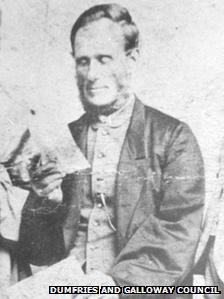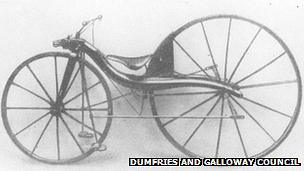Kirkpatrick Macmillan: 200th anniversary of man who pioneered pedal cycles
- Published

Kirkpatrick Macmillan is widely credited with inventing the bicycle
Maybe it is something in the sideburns.
Tour de France winner and Olympic hero Bradley Wiggins has made a bit of a trademark of his own fine facial hair.
And the man who many reckon paved the way for his endeavours also sported some impressive whiskers.
Kirkpatrick Macmillan, widely credited as the inventor of the modern pedal-driven bicycle, was born in the Dumfriesshire village of Kier on 2 September 1812.
The son of a blacksmith, he followed his father into the business and by his 20s had become fascinated with a new means of transport.
Two-wheeled "dandy horses" were growing in popularity but required the rider to push his or her feet on the ground in order to move them forwards.
"Macmillan tired of this crude style of propulsion, and after long and anxious thought he successfully devised a plan to get rid of it," reported James Johnston of the Glasgow Cycling Club in the Gallovidian magazine of 1899.
"Many others had experimented in this direction, but all their attempts had failed."
Along with a friend, he set to work in his smithy attaching pedals to the machine.
It took him about a year to complete and, it is thought that by 1839 he was happy with the finished product.

Macmillan's bicycle weighed 57lbs (about 27kg) and he started it by pushing his feet on the ground
In his book about Macmillan, Devil on Wheels, Gordon Irving describes the scene as "dozens of villagers" gathered to watch its first run.
"To get it started he found it easier - until the cranks on his rear-driven wheel began to move at a fair speed - to mount his machine and get it going by striking the ground with his feet," he said.
"The villagers watched in total amazement as he lifted his feet to the pedals and went whizzing down the rough highway, the first person anywhere in the world to ride on a velocipede, and propel himself along without touching the ground.
"The bicycle as we know it today had been born."
It was not the lightweight creation which is nowadays produced at a rate of about 100 million-a-year.
Tipping the scales at an estimated 57lbs (about 27kg) it was a tricky beast to manoeuvre but Macmillan was soon growing in confidence in its use and gaining speed.
The sight of him flying through the countryside aboard his new means of transport earned him the nickname "Daft Pate".
He went as far north as Carronbridge, at the entrance to the Dalveen Pass, and as far south as Holywood.
Soon he was able to travel the 14 miles to Dumfries in less than an hour
By 6 June 1842, reports suggest he was ready to undertake the trip to Glasgow.
"Women and children cheered him," claimed his biographer.
"Others - many others - still ran indoors when they saw him approaching.
"Workers in the fields left their crops to line the roadsides and see this amazing, this amusing 'man on wheels' pass by."
It was only as he approached the south side of Glasgow that problems arose.
Newspapers of the time report an unnamed Dumfriesshire man cycling to avoid a crowd and striking a young girl.
The rider was fined five shillings for the offence and many have concluded it must have been Macmillan.
Not everyone is completely convinced by this version of events, cited as proof of his inventor's role.
Alastair Dodds, in his book Scottish Bicycles and Tricycles, was not persuaded by the evidence.
"Whether indeed Macmillan was the inventor of the bicycle or merely a copyist may never be known but it is almost certain that the inventor was Scots," he wrote.
"The sheer number of stories suggests that there must have been quite a cottage industry building various types in Lowland Scotland at this time."
Writing in the late 19th Century, however, James Johnston had no such doubts.
"The word 'bicycle' means, of course, properly speaking, the first two-wheeler propelled and steered with the feet off the ground, and he was undoubtedly the first man to solve this problem and construct a really practicable bicycle," he said.

A small plaque at the Courthill Smithy recognises Macmillan's role in inventing the bicycle
Whatever the case, it brought him little fame or fortune during his life.
"He took out no patent, being too busy otherwise with his lucrative country business," wrote Johnston.
"I hardly think you can blame Scotsmen - or the world - for not honouring or even remembering Kirkpatrick Macmillan, blacksmith and bicycle inventor," added Irving.
"The man himself did not fully realise the importance of his work."
Macmillan married in his 40s and had six children with his young wife Elspeth.
Only two of his children would outlive their father, while his wife also passed away aged just 32.
Macmillan himself died in 1878 and a plaque at the Courthill Smithy sums him up in just six simple words taken from the poem The Problem by Ralph Waldo Emerson.
"He builded better than he knew".
- Published13 April 2011